That 25¢ (That You Paid)
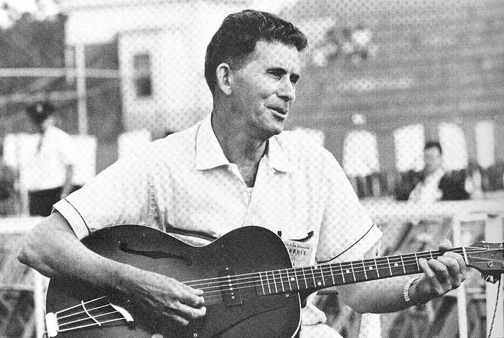
Sad the day when I saw the steam shovels a-comin'
(continua)
(continua)
inviata da Bernart Bartleby 29/9/2019 - 13:37
I Don't Want Your Millions, Mister
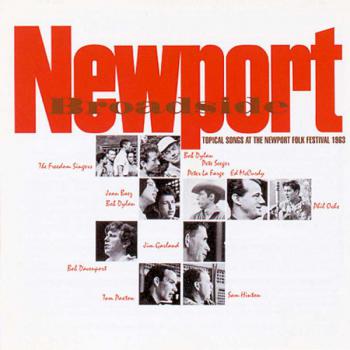
La canzone non dovrebbe essere attibuita a Barbara Dane.
Prima di lei (la sua versione è del 1973) l’hanno incisa infatti molti altri, a cominciare dall’autore stesso, Jim Garland (che, fra l’altro, era il fratellastro di Sarah Ogan Gunning)
La sua versione originale si trova, per esempio, nella raccolta intitolata “Newport Broadside”, registrazione del Newport Folk Festival del 1963, pubblicata dalla Vanguard nel 1964.
Quella di Woody Guthrie con Pete Seegere The Almanac Singers è del 1941 (poi in “Talking Union and Other Union Songs” del 1955)…
Quella di Tom Rush del 1963…
Quindi Barbara Dane c’entra veramente poco e attribuirei il brano a Jim Garland, che fu anche il coautore, con la sorella Aunt Molly Jackson, di The Death of Harry Simms.
Prima di lei (la sua versione è del 1973) l’hanno incisa infatti molti altri, a cominciare dall’autore stesso, Jim Garland (che, fra l’altro, era il fratellastro di Sarah Ogan Gunning)
La sua versione originale si trova, per esempio, nella raccolta intitolata “Newport Broadside”, registrazione del Newport Folk Festival del 1963, pubblicata dalla Vanguard nel 1964.
Quella di Woody Guthrie con Pete Seegere The Almanac Singers è del 1941 (poi in “Talking Union and Other Union Songs” del 1955)…
Quella di Tom Rush del 1963…
Quindi Barbara Dane c’entra veramente poco e attribuirei il brano a Jim Garland, che fu anche il coautore, con la sorella Aunt Molly Jackson, di The Death of Harry Simms.
Bernart Bartleby 15/4/2015 - 11:39
Crossbone Skully
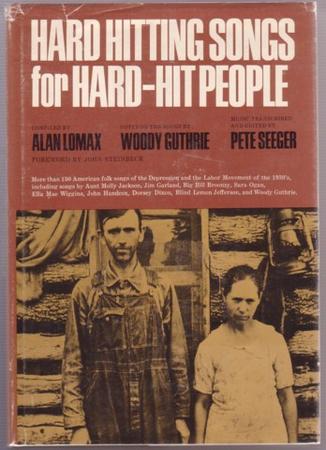
[1930s]
Sulla melodia della popolare “Cumberland Gap”
Testo trovato su Mudcat Café
Dal volume “Hard Hitting Songs for Hard-Hit People”, realizzato da Alan Lomax, Woody Guthrie e Pete Seeger tra il 1940 ed il 1967, anno della sua definitiva pubblicazione.
Probabilmente “Crossbone Skully” (quello dal teschio con le ossa incrociate) è il soprannome del disperato protagonista della canzone, sarà stato un tatuaggio o sarà stato che era ridotto tutto pelle ed ossa dalla fame…
La canzone è stata interpretata anche da Peggy Seeger con il titolo "Peacock Street".
Sulla melodia della popolare “Cumberland Gap”
Testo trovato su Mudcat Café
Dal volume “Hard Hitting Songs for Hard-Hit People”, realizzato da Alan Lomax, Woody Guthrie e Pete Seeger tra il 1940 ed il 1967, anno della sua definitiva pubblicazione.
Probabilmente “Crossbone Skully” (quello dal teschio con le ossa incrociate) è il soprannome del disperato protagonista della canzone, sarà stato un tatuaggio o sarà stato che era ridotto tutto pelle ed ossa dalla fame…
La canzone è stata interpretata anche da Peggy Seeger con il titolo "Peacock Street".
As I went walking down Peacock Street,
(continua)
(continua)
inviata da Bartleby 25/3/2011 - 13:52
I Am a Union Woman
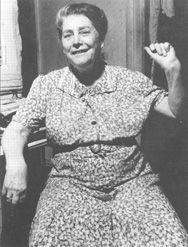
[1919?]
La canzone che apre l’album “The Songs and Stories of Aunt Molly Jackson”, Folkways Records, 1961.
“This is perhaps Aunt Molly‘s most famous song. The tune, originally that of a Baptist hymn which Aunt Molly in her most introspective moments could be persuaded to sing, is known to many as that used for a later miners composition, "Which Side Are You On?". Aunt Molly's song has an immediacy that the other song lacks. She said, When I was organizing the miners around Bell and Harlan counties in 19 and 31 I sang this song. I used it in my organizational work; I always sang this song before giving my speech. "
N. M. U. is the National Miners Union.”
(Introduzione alla canzone dal libretto del disco.)
La canzone che apre l’album “The Songs and Stories of Aunt Molly Jackson”, Folkways Records, 1961.
“This is perhaps Aunt Molly‘s most famous song. The tune, originally that of a Baptist hymn which Aunt Molly in her most introspective moments could be persuaded to sing, is known to many as that used for a later miners composition, "Which Side Are You On?". Aunt Molly's song has an immediacy that the other song lacks. She said, When I was organizing the miners around Bell and Harlan counties in 19 and 31 I sang this song. I used it in my organizational work; I always sang this song before giving my speech. "
N. M. U. is the National Miners Union.”
(Introduzione alla canzone dal libretto del disco.)
I am a union woman
(continua)
(continua)
inviata da Bartleby 25/3/2011 - 10:09
Come All You Coal Miners
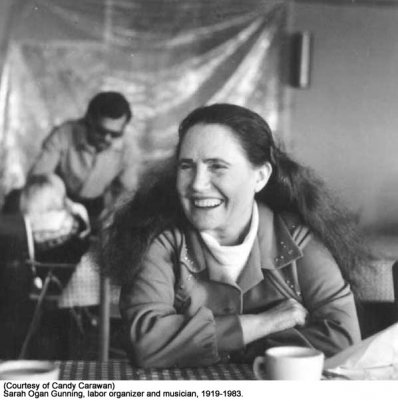
[1937]
Lyrics and Music by Sarah Ogan Gunning
Album: Harlan County USA Songs Of Th[2006]
Sarah Garland Gunning (later Sarah Ogan Gunning) was the tenth of 11 children in a Kentucky mining family, at a time when miners were paid less than a dollar and a half for a ten-hour day and worked in appalling conditions. Her father, Jim Garland, was blacklisted as he represented the miners in their fight for better wages, forcing him to use aliases in order go work in the mines. In 1931, a group of Northerners called the Dreiser Committee came to Kentucky to investigate atrocities committed against the miners, and brought their plight to national attention.
Sarah Garland and her sister, Molly (later known as Aunt Molly Jackson) wrote and sang songs in support of the struggle at labor rallies. They were taken to New York by members of the Dreiser Committee to help raise money for the miners' cause.... (continua)
Lyrics and Music by Sarah Ogan Gunning
Album: Harlan County USA Songs Of Th[2006]
Sarah Garland Gunning (later Sarah Ogan Gunning) was the tenth of 11 children in a Kentucky mining family, at a time when miners were paid less than a dollar and a half for a ten-hour day and worked in appalling conditions. Her father, Jim Garland, was blacklisted as he represented the miners in their fight for better wages, forcing him to use aliases in order go work in the mines. In 1931, a group of Northerners called the Dreiser Committee came to Kentucky to investigate atrocities committed against the miners, and brought their plight to national attention.
Sarah Garland and her sister, Molly (later known as Aunt Molly Jackson) wrote and sang songs in support of the struggle at labor rallies. They were taken to New York by members of the Dreiser Committee to help raise money for the miners' cause.... (continua)
Come all you coal miners wherever you may be
(continua)
(continua)
inviata da giorgio 31/5/2010 - 19:58
The Kent State Massacre
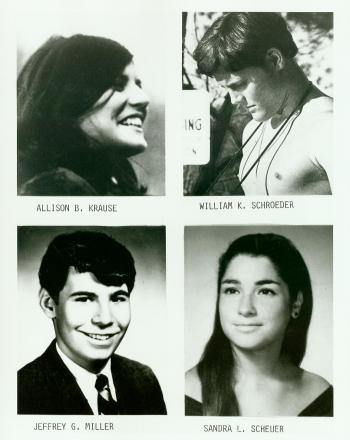
[1970]
Words by Jack Warshaw and Barbara Dane.
Melody from The Death of Harry Simms (Aunt Molly Jackson).
Album “I Hate the Capitalist System”,
Paredon Records, 1973.
“The capitalist system, since its earliest days when little children were employed in the mills and sweatshops, has destroyed its young. In recent times it has demonstrated that it will not tolerate the most modest challenge to its power by murdering students during peaceful demonstrations on campuses.
There is a direct line of continuity from the murders at Orangeburg of Sam Hammon, 18, Delano Middleton, 17, and Henry Smith, 18, to the murders at Jackson State in Mississippi of Phillip Gibbs, 19 and James Green, 17, to the murders at Kent State, Ohio.
The line continues to the needless victimization of hundreds of thousands of their generation who were sent away to fight and die or come home maimed in body or spirit,... (continua)
Words by Jack Warshaw and Barbara Dane.
Melody from The Death of Harry Simms (Aunt Molly Jackson).
Album “I Hate the Capitalist System”,
Paredon Records, 1973.
“The capitalist system, since its earliest days when little children were employed in the mills and sweatshops, has destroyed its young. In recent times it has demonstrated that it will not tolerate the most modest challenge to its power by murdering students during peaceful demonstrations on campuses.
There is a direct line of continuity from the murders at Orangeburg of Sam Hammon, 18, Delano Middleton, 17, and Henry Smith, 18, to the murders at Jackson State in Mississippi of Phillip Gibbs, 19 and James Green, 17, to the murders at Kent State, Ohio.
The line continues to the needless victimization of hundreds of thousands of their generation who were sent away to fight and die or come home maimed in body or spirit,... (continua)
Brothers, listen to my story,
(continua)
(continua)
inviata da Alessandro 17/3/2010 - 13:04
I Hate the Capitalist System
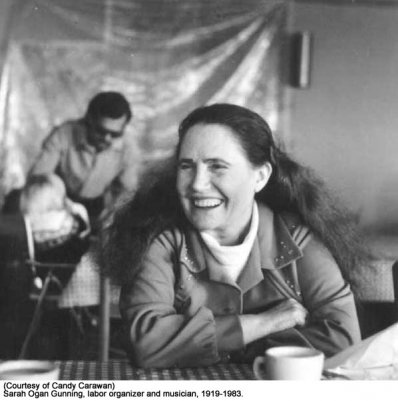
[193?]
Parole e musica di Sarah Ogan Gunning, sorellastra di Aunt Molly Jackson.
Dall’album “Girl of Constant Sorrow”, Folk Legacy Records, 1965.
Riproposta da Barbara Dane nell’album “I Hate the Capitalist System”, Paredon Records, 1973.
“Dedication. This recording is respectfully dedicated to the millions of hard-working people who really made America great, in the sure knowledge that one day they will gather up their strength, their courage and their wisdom, and they will come together to smash this decayed and dying system. They will use their inventiveness and industry to raise all our people to a decent living standard, and restore us to a place of respect among the fellowship of nations. They are the creators of history, and they will construct the socialist future.
Specifically, I want to dedicate these songs to my sister , Julia, who has recently entered that great school... (continua)
Parole e musica di Sarah Ogan Gunning, sorellastra di Aunt Molly Jackson.
Dall’album “Girl of Constant Sorrow”, Folk Legacy Records, 1965.
Riproposta da Barbara Dane nell’album “I Hate the Capitalist System”, Paredon Records, 1973.
“Dedication. This recording is respectfully dedicated to the millions of hard-working people who really made America great, in the sure knowledge that one day they will gather up their strength, their courage and their wisdom, and they will come together to smash this decayed and dying system. They will use their inventiveness and industry to raise all our people to a decent living standard, and restore us to a place of respect among the fellowship of nations. They are the creators of history, and they will construct the socialist future.
Specifically, I want to dedicate these songs to my sister , Julia, who has recently entered that great school... (continua)
I hate the capitalist system,
(continua)
(continua)
inviata da Alessandro 16/3/2010 - 13:35
Join the GI Movement
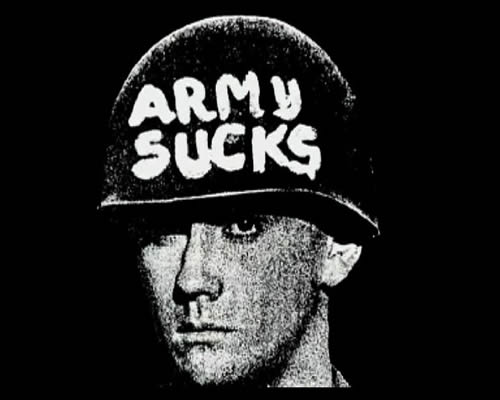
[1970]
Words by Barbara Dane
Based on Aunt Molly Jackson' "I Am a Union Woman" (1931)
Album “F.T.A.! Songs et the GI Resistance”, Paredon Records
Sung by Barbara Dane with active-duty GIs.
Recorded at Fort Hood, Texas, Fort Benning, Georgia and Fort Bragg, North Carolina.
Edited by Irwin Silber.
“Back in the early '30s a great singing organizer in the bloody mine battles was Aunt Molly Jackson. She was the sister of two other great people's singers and fighters, Jim Garland and Sarah Ogan Gunning. The whole family was blacklisted from work because of their union activities, and they finally had to move away from Harlan County just to live. But their legacy of songs has stayed with us and keeps on being useful, wherever people are finding the strength and courage to fight for their rights. It seemed to me that this old chorus which used to be "Join the CIO" would help the guys who... (continua)
Words by Barbara Dane
Based on Aunt Molly Jackson' "I Am a Union Woman" (1931)
Album “F.T.A.! Songs et the GI Resistance”, Paredon Records
Sung by Barbara Dane with active-duty GIs.
Recorded at Fort Hood, Texas, Fort Benning, Georgia and Fort Bragg, North Carolina.
Edited by Irwin Silber.
“Back in the early '30s a great singing organizer in the bloody mine battles was Aunt Molly Jackson. She was the sister of two other great people's singers and fighters, Jim Garland and Sarah Ogan Gunning. The whole family was blacklisted from work because of their union activities, and they finally had to move away from Harlan County just to live. But their legacy of songs has stayed with us and keeps on being useful, wherever people are finding the strength and courage to fight for their rights. It seemed to me that this old chorus which used to be "Join the CIO" would help the guys who... (continua)
I am a GI rebel,
(continua)
(continua)
inviata da Alessandro 15/3/2010 - 13:53
Hard Times in Colman's Mines
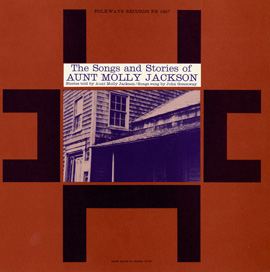
[1910]
Songs sung by John Greenway
Album “The Songs and Stories of Aunt Molly Jackson”, Folkways Records, 1961.
“This is a song I composed in 19 and l0 at a mining company in Bell County, Kentucky, when I was trying to get the miners to come out in strike for eight hours and better pay, and for decent homes to live in. I would sing this song and then I would make a long speech, and this way I organized that group of miners while they was in my reach. Colman was the name of the coal operator. He was working over 400 men in this way in 19 and l0. This song will tell you the awful condition the miners was in”
(dal libretto che accompagna il disco)
Songs sung by John Greenway
Album “The Songs and Stories of Aunt Molly Jackson”, Folkways Records, 1961.
“This is a song I composed in 19 and l0 at a mining company in Bell County, Kentucky, when I was trying to get the miners to come out in strike for eight hours and better pay, and for decent homes to live in. I would sing this song and then I would make a long speech, and this way I organized that group of miners while they was in my reach. Colman was the name of the coal operator. He was working over 400 men in this way in 19 and l0. This song will tell you the awful condition the miners was in”
(dal libretto che accompagna il disco)
Come out on strike, boys, it's all you can do;
(continua)
(continua)
inviata da Alessandro 15/3/2010 - 13:12
The Death of Harry Simms
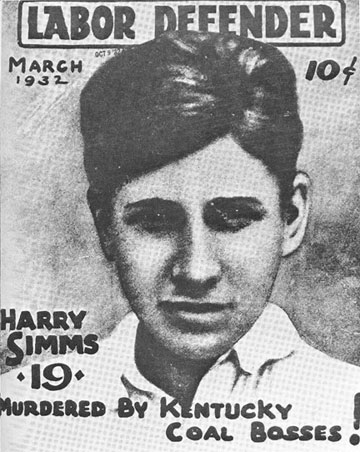
[1932]
Album “The Songs and Stories of Aunt Molly Jackson”, Folkways Records, 1961.
Lyrics and music by Aunt Molly Jackson and his brother Jim Garland.
Songs sung by John Greenway
Harry Simms, nato Hersh, era un giovane ebreo appartenente alla Young Communist League, attivista sindacale e buon amico del fratello di Aunt Molly Jackson, Jim Garland, anch’egli impegnato nel sindacato dei minatori del Kentucky.
Aveva solo 19 anni, Harry Simms, quando la United Mine Workers lo inviò nelle contee di Bell ed Harlan (chiamata ormai “Bloody Harlan”) dove più cruento era il confronto tra i minatori, in lotta per il miglioramento delle condizioni di lavoro, e le compagnie, che usavano polizia, squadracce e crumiri per intimidire i minatori e piegarne la determinazione. Al suo arrivo il giovane sindacalista fu ospitato proprio a casa di Jim Garland… L’11 febbraio 1932, di buon mattino, Harry si... (continua)
Album “The Songs and Stories of Aunt Molly Jackson”, Folkways Records, 1961.
Lyrics and music by Aunt Molly Jackson and his brother Jim Garland.
Songs sung by John Greenway
Harry Simms, nato Hersh, era un giovane ebreo appartenente alla Young Communist League, attivista sindacale e buon amico del fratello di Aunt Molly Jackson, Jim Garland, anch’egli impegnato nel sindacato dei minatori del Kentucky.
Aveva solo 19 anni, Harry Simms, quando la United Mine Workers lo inviò nelle contee di Bell ed Harlan (chiamata ormai “Bloody Harlan”) dove più cruento era il confronto tra i minatori, in lotta per il miglioramento delle condizioni di lavoro, e le compagnie, che usavano polizia, squadracce e crumiri per intimidire i minatori e piegarne la determinazione. Al suo arrivo il giovane sindacalista fu ospitato proprio a casa di Jim Garland… L’11 febbraio 1932, di buon mattino, Harry si... (continua)
Come and listen to my story,
(continua)
(continua)
inviata da Alessandro 15/3/2010 - 12:57
×
![]()

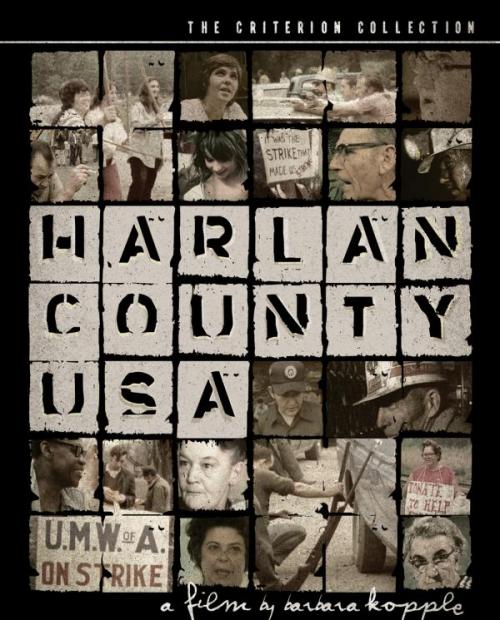
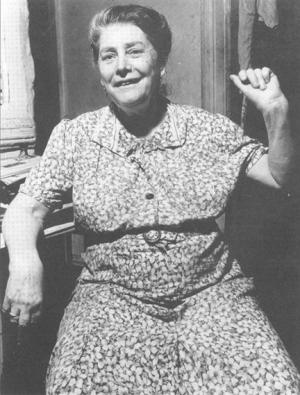
Una canzone scritta da Jim Garland (1905-1978), cantautore del Kentucky, strettamente imparentato con Aunt Molly Jackson e Sarah Ogan Gunning
Trovo questo brano innanzitutto nella raccolta "Come All You Coal Miners" come interpretato da Sarah Ogan. Quindi in "Mountain Songs" di Guy Carawan,1974. Infine nella raccolta "They'll Never Keep Us Down: Women's Coal Mining Songs", 1984, ancora con la voce della Ogan Gunning.
Testo trovato su LyricWiki